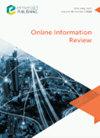The impact of social media marketing activities in the museum industry
IF 3.1
3区 管理学
Q2 COMPUTER SCIENCE, INFORMATION SYSTEMS
引用次数: 1
Abstract
PurposeThe social media expands the scope of museum marketing. Through the social media marketing, visitors get a rich and colorful visual experience, and the museum can quickly and effectively convey various information to visitors. At present, the research on social media in the museum industry mainly focuses on the level of technology use, while the research on the marketing application of social media is relatively scarce, especially from the empirical perspective. This study constructs a conceptual model to identify the impact of SMMAs on visitor experience in the context of the museum industry through the empirical analysis.Design/methodology/approachA survey is conducted with a total of 538 visitors who follow the fan page of the Palace Museum Weibo. The collected data are analyzed via structural equation modeling.FindingsThe results show that SMMAs have significant effects on social presence and social support, which in turn significantly affect flow state. Moreover, the results demonstrate that social presence and social support partially mediates the relationships between SMMAs and flow state.Originality/valueThe contribution of this study is twofold. First, from a theoretical perspective, it offers new insights into the conceptualization of social media marketing. Second, from a pragmatic perspective, the results are helpful to guide museums how to carry out social media marketing activities.Peer reviewThe peer review history for this article is available at: https://publons.com/publon/10.1108/OIR-12-2020-0564社会媒体营销活动对博物馆行业的影响
社交媒体拓展了博物馆营销的范围。通过社会化媒体营销,参观者可以获得丰富多彩的视觉体验,博物馆可以快速有效地向参观者传达各种信息。目前,对博物馆行业社会化媒体的研究主要集中在技术使用层面,而对社会化媒体营销应用的研究相对较少,尤其是从实证角度进行的研究。本研究通过实证分析,构建了一个概念模型,以确定博物馆产业背景下SMMAs对游客体验的影响。设计/方法/方法对538名关注故宫博物院微博粉丝页的游客进行了调查。通过结构方程建模对收集到的数据进行分析。结果表明,社会存在和社会支持对流动状态有显著影响,社会存在和社会支持对流动状态有显著影响。此外,社会存在和社会支持在SMMAs与流动状态的关系中起部分中介作用。本研究的贡献是双重的。首先,从理论角度来看,它为社会化媒体营销的概念化提供了新的见解。其次,从实用主义的角度来看,研究结果有助于指导博物馆如何开展社会化媒体营销活动。同行评议本文的同行评议历史可在:https://publons.com/publon/10.1108/OIR-12-2020-0564
本文章由计算机程序翻译,如有差异,请以英文原文为准。
求助全文
约1分钟内获得全文
求助全文
来源期刊

Online Information Review
工程技术-计算机:信息系统
CiteScore
6.90
自引率
16.10%
发文量
67
审稿时长
6 months
期刊介绍:
The journal provides a multi-disciplinary forum for scholars from a range of fields, including information studies/iSchools, data studies, internet studies, media and communication studies and information systems.
Publishes research on the social, political and ethical aspects of emergent digital information practices and platforms, and welcomes submissions that draw upon critical and socio-technical perspectives in order to address these developments.
Welcomes empirical, conceptual and methodological contributions on any topics relevant to the broad field of digital information and communication, however we are particularly interested in receiving submissions that address emerging issues around the below topics.
Coverage includes (but is not limited to):
•Online communities, social networking and social media, including online political communication; crowdsourcing; positive computing and wellbeing.
•The social drivers and implications of emerging data practices, including open data; big data; data journeys and flows; and research data management.
•Digital transformations including organisations’ use of information technologies (e.g. Internet of Things and digitisation of user experience) to improve economic and social welfare, health and wellbeing, and protect the environment.
•Developments in digital scholarship and the production and use of scholarly content.
•Online and digital research methods, including their ethical aspects.
 求助内容:
求助内容: 应助结果提醒方式:
应助结果提醒方式:


